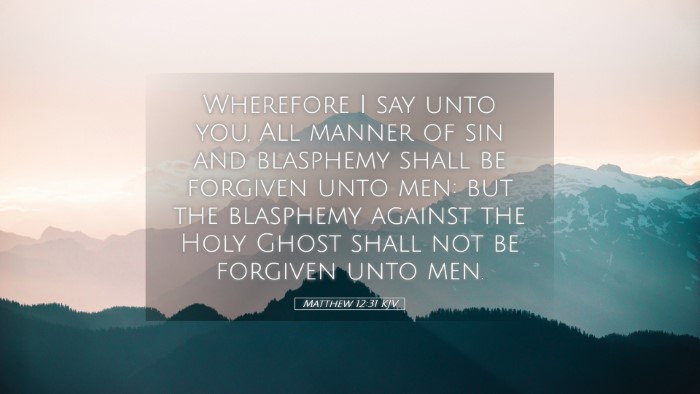Commentary on Matthew 12:31
Matthew 12:31 states: "Therefore I say to you, every sin and blasphemy will be forgiven men, but the blasphemy against the Spirit will not be forgiven."
Introduction
This verse presents one of the most profound theological statements concerning sin and forgiveness found in the New Testament. It addresses the nature of blasphemy and its implications for salvation. The importance of this verse cannot be overstated, as it holds significant implications for doctrines of sin and the work of the Holy Spirit.
Historical Context
In the broader context of Matthew 12, Jesus has been confronted by the Pharisees who accuse Him of casting out demons by the power of Beelzebub. His main argument emphasizes the impossibility of opposing Himself and seeks to show that their accusation is not merely a misunderstanding; it is a profound moral error.
The Nature of Sin and Forgiveness
Matthew Henry, in his commentary, emphasizes that while God is rich in mercy, there is a special category of offense that comes with severe consequences. He asserts: "Every sin can be forgiven, but the sin against the Holy Spirit is deliberate and unrepentant."
The Scope of Forgiveness
Here, Jesus makes it clear that His atoning sacrifice is sufficient to cover a vast array of human failings. Albert Barnes highlights this when he states: "No matter how grievous or numerous the transgressions, they can be brought before God with a repentant heart, and through Christ’s blood, redemption is possible."
The Unforgivable Sin
In contrast, the "blasphemy against the Spirit" refers to a conscious and willful rejection of the Godhead and the work of the Holy Spirit. Adam Clarke stresses this point, saying: "Those who are fully aware of the divine truth and still choose to oppose it constitute this category of unforgivable sin."
Theological Implications
The theology surrounding Matthew 12:31 is crucial in understanding the character of God, human response to divine revelation, and the work of the Holy Spirit in sanctification. Theologians often draw from this verse to highlight:
- The Nature of God’s Mercy: God desires all to come to repentance (2 Peter 3:9), showcasing a heart of forgiveness towards those who seek Him.
- The Role of the Holy Spirit: The Holy Spirit's role is not only to convict of sin but also to reveal God’s truth, and rejecting this prompt leads to dire consequences.
- The Urgency of Repentance: The distinction between forgivable and unforgivable sin serves as a warning to take the call to repentance seriously.
Practical Applications
For pastors and ministers, this scripture serves as a potent reminder of the importance of teaching the doctrine of sin and forgiveness. Engaging congregations on these topics can foster:
- A deeper understanding of grace: Helping individuals recognize the expansive nature of God’s grace fosters hope and peace.
- Awareness of spiritual danger: Educating followers about the dangers of hardening one's heart against the prompting of the Holy Spirit can encourage sensitivity to His leading.
- Encouragement to evangelize: The message of forgiveness encourages believers to share the Gospel despite the gravity of sin.
Conclusion
Matthew 12:31 invites deep reflection on the nature of sin, the character of God, and the imperative nature of the gospel message. The duality of forgiveness and the seriousness of blasphemy against the Holy Spirit compel both caution and hope. Acknowledging these truths leads to a richer understanding of one's relationship with God, the necessity of repentance, and the abundant grace available through Jesus Christ. The insights from Matthew Henry, Albert Barnes, and Adam Clarke provide valuable context and interpretation, enhancing our appreciation of this critical verse.


